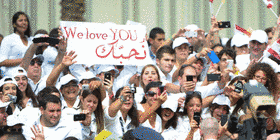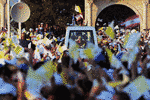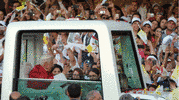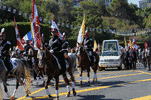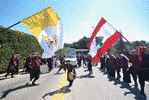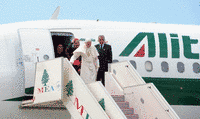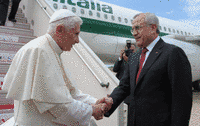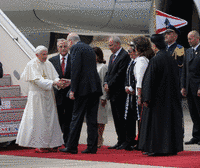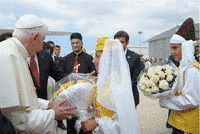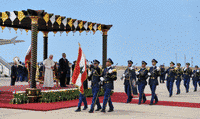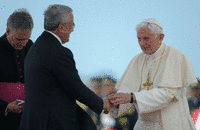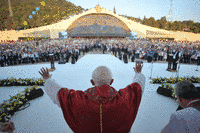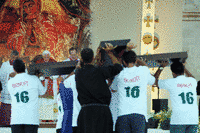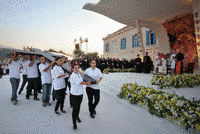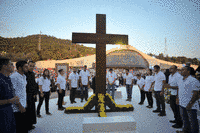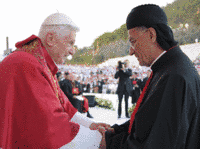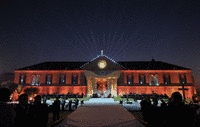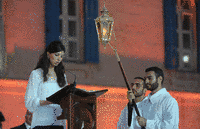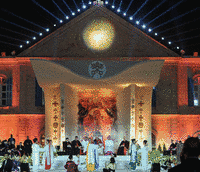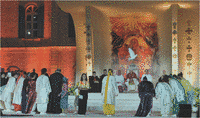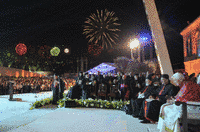Benedict XVI's Apostolic Pilgrimage to Lebanon
Feast of the Triumph of the Cross, 14 September - 16 September 2012
Pope Benedict XVI was a pilgrim to Lebanon on his last apostolic voyage abroad, on the occasion of the signing and publication of the Post-Synodal Apostolic Exhortation of the Special Assembly for the Middle East of the Synod of Bishops.
Pape Benoît spoke with journalists on the flight to Beirut, where he was welcomed at Rafic Hariri Airport. His first visit was to St. Paul's Basilica in Harissa, for the signing of Ecclesia in Medio Oriente, the Post-Synodal Apostolic Exhortation on the Church in the Middle East: Communion and Witness, on the Feast of the Exultation of the Cross. The next day Pope Benedict met with members of the government, the diplomatic corps, religious leaders and representatives of the world of culture in the Baabda Presidential Palace, before lunching with the Patriarchs and Bishops of Lebanon, members of the Special Council for the Middle East of the Synod of Bishops and the papal entourage at the Armenian Catholic Patriachate of Bzommar. The evening was spent with young people in the square across from the Maronite Patriarchate of Bkerké. Holy Mass on Sunday 16 September was celebrated at the Beirut City Center Waterfront and included the presentation of the Post-Synodal Apostolic Exhortation for the Middle East. Following the Recitation of the Angelus, there was an Ecumenical Meeting in the Hall of Honor of the Syro-Catholic Patriarchate of Charfet before Papa Benedetto's departure from Beirut. Click here for the Missal for his visit.
Discours du Pape Benoît XVI à l'aéroport
Beyrouth, Vendredi 14 septembre 2012 - also in Arabic, English, German, Italian, Polish, Portuguese & Spanish
"Monsieur le Président de la République,
Messieurs les Présidents du Parlement et du Conseil des ministres,
Chères Béatitudes, Membres du Corps diplomatique,
Autorités civiles et religieuses présentes, chers amis,
J’ai la joie, Monsieur le Président, de répondre à l’aimable invitation que vous m’avez adressée à me rendre dans votre pays, ainsi qu’à celle reçue des Patriarches et des Évêques catholiques du Liban. Cette double invitation manifeste, si nécessaire, le double but de ma visite dans votre pays. Elle souligne l’excellence des relations qui existent depuis toujours entre le Liban et le Saint-Siège, et elle voudrait contribuer à les renforcer. Cette visite est aussi la réponse à celles que vous m’avez faites au Vatican en novembre 2008, et plus récemment en février 2011, visite qui a été suivie neuf mois plus tard par celle de Monsieur le Premier Ministre.
C’est lors de la seconde de nos rencontres, que la majestueuse statue de saint Maron a été bénie. Sa présence silencieuse au chevet de la basilique Saint-Pierre rappelle de manière permanente le Liban sur le lieu même où l’apôtre Pierre a été enseveli. Elle manifeste un héritage spirituel séculaire en confirmant la vénération des Libanais pour le premier des Apôtres et pour ses successeurs. C’est pour marquer leur grande dévotion à Simon Pierre que les Patriarches maronites ajoutent à leur prénom celui de Boutros. Il est beau de voir que du sanctuaire pétrinien, Saint Maron intercède continuellement pour votre pays et pour l’ensemble du Moyen-Orient. Je vous remercie par avance, Monsieur le Président, pour tous les efforts entrepris en vue de la bonne réussite de mon séjour parmi vous.
Un autre motif de ma visite est la signature et la remise de l’Exhortation apostolique post-synodale de l’assemblée spéciale pour le Moyen-Orient du Synode des évêques, Ecclesia in Medio Oriente. Il s’agit-là d’un événement ecclésial d’importance. Je remercie tous les Patriarches catholiques qui se sont déplacés, et plus particulièrement le Patriarche émérite, le cher Cardinal Nasrallah Boutros Sfeir, et son successeur, le Patriarche Bechara Boutros Raï. Je salue fraternellement tous les Évêques du Liban, ainsi que ceux qui ont voyagé pour prier avec moi et recevoir des mains-mêmes du Pape ce document. À travers eux, je salue paternellement tous les chrétiens du Moyen-Orient. Destinée à l’ensemble du monde, l’Exhortation se propose d’être pour eux une feuille de route pour les années à venir. Je me réjouis également de pouvoir rencontrer durant ces jours-ci de nombreuses représentations des communautés catholiques de votre pays, de pouvoir célébrer et prier ensemble. Leur présence, leur engagement et leur témoignage sont une contribution reconnue et hautement appréciée dans la vie quotidienne de tous les habitants de votre cher pays.
Je tiens à saluer aussi avec grande déférence les Patriarches et Évêques orthodoxes venus me recevoir, ainsi que les représentants des diverses communautés religieuses du Liban. Votre présence, chers amis, démontre l’estime et la collaboration que vous souhaitez promouvoir entre tous dans le respect mutuel. Je vous remercie pour vos efforts et je suis certain que vous continuerez à rechercher des voies d’unité et de concorde. Je n’oublie pas les événements tristes et douloureux qui ont affligés votre beau pays durant de longues années. L’heureuse convivialité toute libanaise, doit démontrer à l’ensemble du Moyen-Orient et au reste du monde qu’à l’intérieur d’une nation, peuvent exister la collaboration entre les différentes Églises, toutes membres de l’unique Église catholique, dans un esprit fraternel de communion avec les autres chrétiens, et dans le même temps, la convivialité et le dialogue respectueux entre les chrétiens et leurs frères d’autres religions. Vous savez comme moi que cet équilibre qui est présenté partout comme un exemple, est extrêmement délicat. Il menace parfois de se rompre lorsqu’il est tendu comme un arc, ou soumis à des pressions qui sont trop souvent partisanes, voire intéressées, contraires et étrangères à l’harmonie et à la douceur libanaises. C’est là qu’il faut faire preuve de réelle modération et de grande sagesse. Et la raison doit prévaloir sur la passion unilatérale pour favoriser le bien commun de tous. Le grand roi Salomon qui connaissait Hiram, le roi de Tyr, n’a-t-il pas jugé que la sagesse était la vertu suprême ? C’est pourquoi il l’a demandée à Dieu instamment, et Dieu lui donna un cœur sage et intelligent (cf.1 R 3, 9-12).
Je viens aussi pour dire combien est importante la présence de Dieu dans la vie de chacun et combien la façon de vivre ensemble, cette convivialité dont désire témoigner votre pays, ne sera profonde que si elle est fondée sur un regard accueillant et une attitude de bienveillance envers l’autre, que si elle est enracinée en Dieu qui désire que tous les hommes soient frères. Le fameux équilibre libanais qui veut continuer à être une réalité, peut se prolonger grâce à la bonne volonté et à l’engagement de tous les Libanais. Alors seulement, il servira de modèle aux habitants de toute la région, et au monde entier. Il ne s’agit pas là uniquement d’une œuvre humaine, mais d’un don de Dieu qu’il faut demander avec insistance, préserver à tout prix, et consolider avec détermination.
Les liens entre le Liban et le Successeur de Pierre sont historiques et profonds. Monsieur le Président et chers amis, je viens au Liban comme un pèlerin de paix, comme un ami de Dieu, et comme un ami des hommes. «سَلامي أُعطيكُم [«Je vous donne ma paix»] dit le Christ (Jn 14, 27). Et au-delà de votre pays, je viens aussi aujourd’hui symboliquement dans tous les pays du Moyen Orient, comme un pèlerin de paix, comme un ami de Dieu, et comme un ami de tous les habitants de tous les pays de la région quelles que soient leur appartenance et leur croyance. À eux aussi le Christ dit : سَلامي أُعطيكُم. Vos joies et vos peines sont continuellement présentes dans la prière du Pape et je demande à Dieu de vous accompagner et de vous soulager. Je puis vous assurer que je prie particulièrement pour tous ceux qui souffrent dans cette région, et ils sont nombreux. La statue de saint Maron me rappelle ce que vous vivez et endurez.
Monsieur le Président, je sais que votre pays me prépare un bel accueil, un accueil chaleureux, l’accueil que l’on réserve à un frère aimé et respecté. Je sais que votre pays veut être digne de « l’Ahlan wa Sahlan » libanais. Il l’est déjà et le sera dorénavant encore plus. Je suis heureux d’être avec vous tous. لِيُبَارِك الربُّ جميعَكُم Merci !
Pope Benedict XVI's address in St Paul's Basilica
at signing of the Post-Synodal Apostolic Exhortation
Harissa, Friday 14 September 2012 - also in Arabic, French, German, Italian, Polish, Portuguese & Spanish
"Mr President, Your Beatitude, Venerable Patriarchs, Dear Brother Bishops & Members of the Special Council of the Synod of Bishops for the Middle East, Distinguished Representatives of the various religious confessions, the world of culture and civil society, Dear Brothers and Sisters in Christ, Dear Friends,
I thank Patriarch Gregorios Laham for his words of welcome, and the Secretary-General of the Synod of Bishops, Archbishop Nikola Eterović, for his introduction. My warm greetings go to the Patriarchs, to all the Eastern and Latin Bishops assembled in this beautiful Cathedral of Saint Paul, and to the members of the Special Council of the Synod of Bishops for the Middle East. I am also gratified by the presence of the Orthodox, Muslim and Druze delegations, as well as those from the world of culture and from civil society. The happy coexistence of Islam and Christianity, two religions that have helped to shape great cultures, is what makes for the originality of social, political and religious life in Lebanon. One can only rejoice in this circumstance, which must absolutely be encouraged. I entrust this wish to the religious leaders of your country. I greet with affection the beloved Greek Melkite community with gratitude for your welcome. Your presence makes my signing of the Post-Synodal Apostolic Exhortation Ecclesia in Medio Oriente all the more solemn; it testifies that this document, while addressed to the universal Church, has a particular importance for the entire Middle East.
Providentially, this event takes place on the Feast of the Exaltation of the Holy Cross, a celebration originating in the East in 335, following the dedication of the Basilica of the Resurrection built over Golgotha and our Lord’s tomb by the Emperor Constantine the Great, whom you venerate as saint. A month from now we will celebrate the seventeen-hundredth anniversary of the appearance to Constantine of the Chi-Rho, radiant in the symbolic night of his unbelief and accompanied by the words: “In this sign you will conquer!” Later, Constantine signed the Edict of Milan, and gave his name to Constantinople. It seems to me that the Post-Synodal Exhortation can be read and understood in the light of this Feast of the Exaltation of the Cross, and more particularly in the light of the Chi-Rho, the two first letters of the Greek word “Christos”. Reading it in this way leads to renewed appreciation of the identity of each baptized person and of the Church, and is at the same time a summons to witness in and through communion. Are not Christian communion and witness grounded in the Paschal Mystery, in the crucifixion, death and resurrection of Christ? Is it not there that they find their fulfilment? There is an inseparable bond between the cross and the resurrection which Christians must never forget. Without this bond, to exalt the cross would mean to justify suffering and death, seeing them merely as our inevitable fate. For Christians, to exalt the cross means to be united to the totality of God’s unconditional love for mankind. It means making an act of faith! To exalt the cross, against the backdrop of the resurrection, means to desire to experience and to show the totality of this love. It means making an act of love! To exalt the cross means to be a committed herald of fraternal and ecclesial communion, the source of authentic Christian witness. It means making an act of hope!
In examining the present situation of the Church in the Middle East, the Synod Fathers reflected on the joys and struggles, the fears and hopes of Christ’s disciples in these lands. In this way, the entire Church was able to hear the troubled cry and see the desperate faces of many men and women who experience grave human and material difficulties, who live amid powerful tensions in fear and uncertainty, who desire to follow Christ – the One who gives meaning to their existence – yet often find themselves prevented from doing so. That is why I wanted the First Letter of Saint Peter to serve as the framework of the document. At the same time, the Church was able to admire all that is beautiful and noble in the Churches in these lands. How can we fail to thank God at every moment for all of you (cf. 1 Th 1:2; Part One of the Post-Synodal Exhortation), dear Christians of the Middle East! How can we fail to praise him for your courage and faith? How can we fail to thank him for the flame of his infinite love which you continue to keep alive and burning in these places which were the first to welcome his incarnate Son? How can we fail to praise and thank him for your efforts to build ecclesial and fraternal communion, and for the human solidarity which you constantly show to all God’s children?
Ecclesia in Medio Oriente makes it possible to rethink the present in order to look to the future with the eyes of Christ. By its biblical and pastoral orientation, its invitation to deeper spiritual and ecclesiological reflection, its call for liturgical and catechetical renewal, and its summons to dialogue, the Exhortation points out a path for rediscovering what is essential: being a follower of Christ even in difficult and sometimes painful situations which may lead to the temptation to ignore or to forget the exaltation of the cross. It is here and now that we are called to celebrate the victory of love over hate, forgiveness over revenge, service over domination, humility over pride, and unity over division. In the light of today’s Feast, and in view of a fruitful application of the Exhortation, I urge all of you to fear not, to stand firm in truth and in purity of faith. This is the language of the cross, exalted and glorious! This is the “folly” of the cross: a folly capable of changing our sufferings into a declaration of love for God and mercy for our neighbour; a folly capable of transforming those who suffer because of their faith and identity into vessels of clay ready to be filled to overflowing by divine gifts more precious than gold (cf. 2 Cor 4:7-18). This is more than simply picturesque language: it is a pressing appeal to act concretely in a way which configures us ever more fully to Christ, in a way which helps the different Churches to reflect the beauty of the first community of believers (cf. Acts 2:41-47: Part Two of the Exhortation); in a way like that of the Emperor Constantine, who could bear witness and bring Christians forth from discrimination to enable them openly and freely to live their faith in Christ crucified, dead and risen for the salvation of all.
Ecclesia in Medio Oriente provides some elements that are helpful for a personal and communal examination of conscience, and an objective evaluation of the commitment and desire for holiness of each one of Christ’s disciples. The Exhortation shows openness to authentic interreligious dialogue based on faith in the one God, the Creator. It also seeks to contribute to an ecumenism full of human, spiritual and charitable fervour, in evangelical truth and love, drawing its strength from the commandment of the risen Lord: “Go therefore and make disciples of all nations, baptizing them in the name of the Father and of the Son and of the Holy Spirit, teaching them to observe all that I have commanded you. Behold, I am with you always, to the close of the age” (Mt 28:19-20).
The Exhortation as a whole is meant to help each of the Lord’s disciples to live fully and to pass on faithfully to others what he or she has become by Baptism: a child of light, sharing in God’s own light, a lamp newly lit amid the troubled darkness of this world, so that the light may shine in the darkness (cf. Jn 1:4f. and 2 Cor 4:1-6). The document seeks to help purify the faith from all that disfigures it, from everything that can obscure the splendour of Christ’s light. For communion is true fidelity to Christ, and Christian witness is the radiance of the paschal mystery which gives full meaning to the cross, exalted and glorious. As his followers, “we proclaim Christ crucified … the power of God and the wisdom of God” (1 Cor 1:23-24; cf. Part Three of the Exhortation).
“Fear not, little flock” (Lk 12:32) and remember the promise made to Constantine: “In this sign you will conquer!” Churches of the Middle East, fear not, for the Lord is truly with you, to the close of the age! Fear not, because the universal Church walks at your side and is humanly and spiritually close to you! It is with this hope and this word of encouragement to be active heralds of the faith by your communion and witness, that on Sunday I will entrust the Post-Synodal Exhortation Ecclesia in Medio Oriente to my venerable brother Patriarchs, Archbishops and Bishops, and to all priests, deacons, men and women religious, the seminarians and all the lay faithful. “Be of good cheer” (Jn 16:33)! Through the intercession of the Virgin Mary, the Theotókos, I invoke God’s abundant gifts upon all of you with great affection! God grant that all the peoples of the Middle East may live in peace, fraternity and religious freedom! لِيُبَارِك الربُّ جميعَكُم [May God bless all of you!]"
Papa Benedict's Meeting with Young People
in the square across from the Maronite Patriarchate of Bkerké
15 September 2012 - in Arabic, English, French, German, Italian, Polish, Portuguese, Spanish + video
"Your Beatitude, Brother Bishops, Mr President,
Dear Friends,
“May grace and peace be multiplied to you in the knowledge of God and of Jesus Christ our Lord” (2 Pet 1:2). The words from the Second Letter of Saint Peter that we have just heard express a desire which I have long felt. Thank you for your warm welcome! I thank you most kindly for your presence in such great numbers this evening! I am grateful to His Beatitude Patriarch Bechara Boutros Raï for his words of welcome, to Archbishop Georges Bou-Jaoudé of Tripoli, the President of the Council for the Lay Apostolate in Lebanon, to Archbishop Elie Haddad of Saïdā of the Greek Melkites, Vice President of the same Council, and to the two young people who greeted me in the name of all present. سَلامي أُعطيكُم – My peace I give to you! (Jn 14:27), Christ Jesus says to us.
Dear friends, you are living today in this part of the world which witnessed the birth of Jesus and the growth of Christianity. It is a great honour! It is also a summons to fidelity, to love of this region and, above all, to your calling to be witnesses and messengers of the joy of Christ. The faith handed down from the Apostles leads to complete freedom and joy, as the many Saints and Blesseds of this country have shown. Their message lights up the universal Church. It can light up your lives as well. Many of the Apostles and saints lived in troubled times and their faith was the source of their courage and their witness. Find in their example and intercession the inspiration and support that you need!
I am aware of the difficulties which you face daily on account of instability and lack of security, your difficulties in finding employment and your sense of being alone and on the margins. In a constantly changing world you are faced with many serious challenges. But not even unemployment and uncertainty should lead you to taste the bitter sweetness of emigration, which involves an uprooting and a separation for the sake of an uncertain future. You are meant to be protagonists of your country’s future and to take your place in society and in the Church.
You have a special place in my heart and in the whole Church, because the Church is always young! The Church trusts you. She counts on you! Be young in the Church! Be young with the Church! The Church needs your enthusiasm and your creativity! Youth is the time when we aspire to great ideals, when we study and train for our future work. All this is important and it takes time. Seek beauty and strive for goodness! Bear witness to the grandeur and the dignity of your body which “is for the Lord” (1 Cor 6:13b). Be thoughtful, upright and pure of heart! In the words of Blessed John Paul II, I say to you: “Do not be afraid! Open the doors of your minds and hearts to Christ!” An encounter with Jesus “gives life a new horizon and a decisive direction” (Deus Caritas Est, 1). In Christ you will find the strength and courage to advance along the paths of life, and to overcome difficulties and suffering. In him you will find the source of joy. Christ says to you: سَلامي أُعطيكُم – My peace I give to you! (Jn 14:27). This is the true revolution brought by Christ: that of love.
The frustrations of the present moment must not lead you to take refuge in parallel worlds like those, for example, of the various narcotics or the bleak world of pornography. As for social networks, they are interesting but they can quite easily lead to addiction and confusion between the real and the virtual. Look for relationships of genuine, uplifting friendship. Find ways to give meaning and depth to your lives; fight superficiality and mindless consumption! You face another temptation, too: that of money, the tyrannical idol which blinds to the point of stifling the person at the heart. The examples being held up all around you are not always the best. Many people have forgotten Christ’s warning that one cannot serve both God and mammon (cf Lk 16:13). Seek out good teachers, spiritual masters, who will be able to guide you along the path to maturity, leaving behind all that is illusory, garish and deceptive.
Bring the love of Christ to everyone! How? By turning unreservedly to God the Father, who is the measure of everything that is right, true and good. Meditate on God’s word! Discover how relevant and real the Gospel can be. Pray! Prayer and the sacraments are the sure and effective means to be a Christian and to live “rooted and built up in Christ, and established in the faith” (Col 2:7). The Year of Faith, which is about to begin, will be a time to rediscover the treasure of the faith which you received at Baptism. You can grow in knowledge and understanding of this treasure by studying the Catechism, so that your faith can be both living and lived. You will then become witnesses to others of the love of Christ. In him, all men and women are our brothers and sisters. The universal brotherhood which he inaugurated on the cross lights up in a resplendent and challenging way the revolution of love. “Love one another as I have loved you” (Jn 13:35). This is the legacy of Jesus and the sign of the Christian. This is the true revolution of love!
Christ asks you, then, to do as he did: to be completely open to others, even if they belong to a different cultural, religious or national group. Making space for them, respecting them, being good to them, making them ever more rich in humanity and firm in the peace of the Lord. I know that many among you take part in various activities sponsored by parishes, schools, movements and associations. It is a fine thing to be engaged with and for others. Experiencing together moments of friendship and joy enables us to resist the onset of division, which must always be rejected! Brotherhood is a foretaste of heaven! The vocation of Christ’s disciples is to be “leaven” in the bread, as Saint Paul says: “a little leaven leavens the whole lump” (Gal 5:9). Be heralds of the Gospel of life and life’s authentic values. Courageously resist everything opposed to life: abortion, violence, rejection of and contempt for others, injustice and war. In this way you will spread peace all around you. Are not “peacemakers” those whom in the end we admire the most? Is it not a world of peace that, deep down, we want for ourselves and for others? سَلامي أُعطيكُم – My peace I give to you! (Jn 14:27), Jesus says. He overcame evil not with more evil, but by taking evil upon himself and destroying it completely on the cross through a love lived to the very end. Truly discovering God’s forgiveness and mercy always enables us to begin a new life. It is not easy to forgive. But God’s forgiveness grants the power of conversion, and the joy of being able to forgive in turn. Forgiveness and reconciliation are the paths of peace; they open up a future.
Dear friends, a number of you are surely asking in a more or less conscious way: What is it that God expects of me? What is his plan for me? Wouldn’t I like to proclaim to the world the grandeur of his love in the priesthood, in the consecrated life or in marriage? Might not Christ be calling me to follow him more closely? Think about these questions with confidence and trust. Take time to reflect on them and ask for enlightenment. Respond to his invitation by offering yourselves daily to the Lord, for he calls you to be his friends. Strive to follow Christ wholeheartedly and generously, for out of love he redeemed us and gave his life for each one of us. You will come to know inconceivable joy and fulfilment! To answer Christ’s call to each of us: that is the secret of true peace.
Yesterday I signed the Apostolic Exhortation Ecclesia in Medio Oriente. This letter is also addressed to you, dear young people, as it is to the entire People of God. Read it carefully and meditate upon it so as to put it into practice. To help you, I remind you of the words of St Paul to the Corinthians: “You yourselves are our letter of recommendation, written in your hearts, to be known and read by all men; and you show that you are a letter from Christ delivered by us, written not with ink but with the Spirit of the living God, not on tablets of stone but on tablets of human hearts” (2 Cor 3:2-3). Dear friends, you too can be a living letter of Christ. This letter will not be written with pen and paper, but with the witness of your lives and your faith. In this way, with courage and enthusiasm, you will enable those around you to understand that God wants the happiness of all without distinction and that Christians are his servants and his faithful witnesses.
Young people of Lebanon, you are the hope and the future of your country. You are Lebanon, a land of welcome, of openness, with a remarkable power of adaptation. At this moment, we cannot forget those millions of individuals who make up the Lebanese diaspora and maintain solid bonds with their land of origin. Young people of Lebanon, be welcoming and open, as Christ asks you and as your country teaches you.
I should like now to greet the young Muslims who are with us this evening. I thank you for your presence, which is so important. Together with the young Christians, you are the future of this fine country and of the Middle East in general. Seek to build it up together! And when you are older, continue to live in unity and harmony with Christians. For the beauty of Lebanon is found in this fine symbiosis. It is vital that the Middle East in general, looking at you, should understand that Muslims and Christians, Islam and Christianity, can live side by side without hatred, with respect for the beliefs of each person, so as to build together a free and humane society.
I understand, too, that present among us there are some young people from Syria. I want to say how much I admire your courage. Tell your families and friends back home that the Pope has not forgotten you. Tell those around you that the Pope is saddened by your sufferings and your griefs. He does not forget Syria in his prayers and concerns, he does not forget those in the Middle East who are suffering. It is time for Muslims and Christians to come together so as to put an end to violence and war.
In conclusion, let us turn to Mary, the Mother of the Lord, our Lady of Lebanon. From the heights of Mount Harissa she protects and accompanies you with a mother’s love. She watches over all the Lebanese people and over the many pilgrims who come from all directions to entrust to her their joys and their sorrows! This evening, let us once more entrust to the Virgin Mary and to Blessed John Paul II, who came here before me, your own lives and the lives of all the young people of Lebanon and the countries of the region, particularly those suffering from violence or from loneliness, those in need of strength and consolation. May God bless you all! And now together, let us lift up our prayer to Mary:
Ave Mariaالسّلامُ عَلَيكِ يا مَرْيَم... (Hail Mary …)"
Papa Benedict XVI's Address at Departure ceremony
Beirut-Rafic Hariri International Airport, 16 September 2012 - in Arabic, English, French, German, Italian, Polish, Portuguese & Spanish + video
فخامة رئيس الجمهورية،
دولة رئيسَيّ مجلس النواب ومجلس الوزراء،
غبطة البطاركة وأخوتي في الأسقفية،
أيّها المسؤولون المدنيون والدينيون، أيّها الأصدقاء الأعزاء،
إذْ حانت لحظةُ الإنطلاق، أشعر بالأسف لمغادرة لبنان العزيز. أشكركم، يا فخامة الرئيس، على كلماتكم، وعلى ما بذلتموه، مع الحكومة التي أتوجّه بالتحية لممثليها، من أجل تنظيم مختلف المناسبات التي دمغت حضوري فيما بينكم، مُساعَدين بطريقة بارزة بكفاءة مختلف أجهزة الجمهورية والقطاع الخاص . أشكر أيضاً غبطة البطريرك مار بشارة بطرس الراعي، وجميع البطاركة الحاضرين وكذلك الأساقفة الشرقيّين واللاتين، والكهنة والشمامسة والرهبان والراهبات، والإكليريكيين والمؤمنين الذين قَدِمُوا لاستقبالي. إن زيارتي لكم، هي وكأنّ بطرس أتى إليكم، وقد استقبلتم بطرس بالمَوَدّة التي يُمَيّزُ كنائسكم وثقافتكم.
أتوجّه بالشكر الخاص إلى الشعب اللبناني بِرُمَّته الذي يُشكّلُ فسيفساءً جميلةً وغنيّةً، والذي استطاع أن يُظهرَ لخليفة بطرس حماسه، من خلال الإسهام المتعدّد الأشكال والخاص بكل جماعة. أشكر بمودّةٍ الكنائس الشقيقة والجماعات البروتستنتيّة الموقّرة. طَوال فترة إقامتي، إستطعتُ أن أستنتجَ كم ساهم حضوركم في إنجاح زيارتي. العالم العربيّ والعالم برُمّته قد شاهدوا، في هذا الأوقات المضطربة، مسيحييّن ومسلمين مجتمعين للإحتفال بالسلام. إنه من التقاليد في الشرق الأوسط أن يُستقبَلَ الضيفُ العابر بانتباهٍ وإحترام، كما فعلتم. أشكركُم جميعاً. ولكن، إلى جانب الانتباه والإحترام، قد أزدتم شيئاً إضافياً؛ يمكن تشبيهُه بإحدى التوابل الشهيرة الشرقية التي تُغني مذاق الأطباق: إنّه حماسكم وقلبكم اللَذَين أعطياني طعم العودة. أشكركم بصورة خاصة على ذلك. الرب يبارككم لهذا!
خلال إقامتي القصيرة جداً، المدفوعة أساساً بتوقيع وتسليم الإرشاد الرسولي الكنيسة في الشرق الأوسط، استطعتُ الالتقاء بمختلف مكوّنات مجتمعكم. كانت هنالك أوقاتاً غلب عليها الطابع الرسميّ وأخرى كانت أكثر وديّة، وأوقاتاً تميّزت بكثافة دينيّة عالية وبصلاةٍ حارّة، وأخرى بحماس الشبيبة. أشكر الرب على هذه الفرص التي سمح بها، وعلى اللقاءات الممتازة التي قمت بها، وعلى الصلاة التي قام بها الجميع، ومن أجل الكلّ في لبنان وفي الشّرق الأوسط، مهما كان أصل كل فرد أو طائفته الدينية.
في حكمته، طلب سليمان من حيرام ملك صور، تشييد بيتٍ لاسم الله، مزارٍ للأبد (راجع: سي ٤٧، ١٣). وحيرام، الذي ذكرتُه عند مجيئي، أرسل خشباً من أرز لبنان (راجع: ١ مل ٥، ٢٢) فكانت منجورات خشب الأرز أثاثاً لداخل الهيكل ومزيّنة بزُهورٍ منقوشةٍ (راجع: ١ مل ٦، ١٨). فكانَ لبنانُ حاضراً في معبدِ الربّ! ليتمكن لبنان اليوم ومواطنيه، من الاستمرار في أن يكونوا حاضرين في معبد الرب! ليتمكن لبنان من الاستمرار في أن يكون فسحةً يعيش فيها الرجال والنساء معاً في تناغم وسلام مع بعضهم البعض ليعطيَ العالم، لا الشهادة لوجود الله وحسب، (الموضوع الأول للسينودس المنصرم)، بل أيضا الشركة بين البشر، (الموضوع الثاني للسينودس نفسه)، مهما كانت حساسياتهم السياسيّة والطائفيّة والدينيّة.
أصلي لله من أجل لبنان، لكي يحيا في السلام ويصمدَ بشجاعة أمام كلَّ مَا مِن شأنه أن يقوّض هذا السلام أو يقضي عليه. وأتمنى للبنان أن يستمرّ في السماح بتعدديّة التقاليد الدينيّة، وألاّ يُصغي لأصوات مَنْ يُريدون مَنْعَها. أتمنى للبنان أن يُعزّزَ الشّركة بين جميع سكّانه، أيّاً كانت جماعتهم أو ديانتهم، بالرفض القاطع لكل ما قد يؤدّي إلى الإنشقاق، وباختيار الأخوّة بحزم. وهذه زهورٌ يُسَرُّ بها الله، وفضائلٌ ممكنة والتي ينبغي تعزيزها بتجذيرها أكثر.
العذراء مريم، المكرَّمّة بإخلاص وحنان، من مؤمني الطوائف الدينيّة الحاضرة هنا، هي مثال أكيد للتقدّم برجاءٍ في طريق أُخُوَّةٍ مُعَاشّةٍ وأصيلة. لبنان قد فهم هذا الأمر جيداً بإعلانه، منذ فترة قصيرة، يوم ٢٥ آذار/مارس عطلة رسمية، سامِحاً بذلك لكل سكانه بالتمكّن من عيش وحدتهم في الطمأنينة بدرجةٍ أكبر. فلتستمر مريم العذراء، التي مزاراتها القديمة عديدة جدّاً في بلدكم، في مرافقتكم وإلهامكم.
ليبارك الله لبنان وكل اللبنانيين! ولا يتوقّف عن جذبهم إليه لإعطائهم حصّة في حياته الأبدية! وليغمرهم بفرحه وسلامه ونوره! ليبارك الله كل الشّرق الأوسط! على كل واحد وواحدة منكم، أستدعي، ومن صميم قلبي، وافر البركات الإلهية! ليبارككم الرب جميعاً!
Benedict XVI's interview with journalists during the flight to Lebanon
Papal Flight - Friday, 14 September 2012 - in English, French, German, Italian, Polish, Portuguese & Spanish
Father Lombardi: Your Holiness, welcome and thank you for being here with us. There are just over 50 journalists in the entourage, representing different language groups and nationalities. Naturally there are many hundreds, perhaps thousands more, waiting for us in Lebanon, and they are all paying close attention to this journey, as they know how demanding and how important it is. We are grateful to you for being with us to answer some challenging questions that the journalists themselves have put together in recent days. The first two questions I will ask in French. The Holy Father will answer in French, as this is more or less the official language of the journey, and the other three will be in Italian.
Your Holiness, many terrible anniversaries are occurring at this time, for example that of the 11 September attacks, and the massacre at the Sabra and Chatila refugee camps. On the borders of Lebanon a civil war is being fought, amid much bloodshed, and in other countries too we see an ever-present risk of violence. Holy Father, what are your feelings as you undertake this journey? Have you been tempted to cancel it for security reasons, or has anyone suggested that you should cancel it?
Holy Father: Dear friends, I am very pleased and grateful for this opportunity to speak with you. I can tell you that no one advised me to cancel this journey, and for my part I never considered doing so, because I know that as the situation becomes more complex, it is all the more necessary to offer this sign of fraternal encouragement and solidarity. That is the aim of my visit: to issue an invitation to dialogue, to peace and against violence, to go forward together to find solutions to the problems. My feelings on this journey are above all feelings of gratitude for the opportunity to visit this great country at this time, a country which – as Pope John Paul II said – is a multiple message, within the region, of encounter and of the origin of the three Abrahamic religions. Above all I am grateful to the Lord who has given me this opportunity, I am grateful to all the institutions and people who have worked and continue to work for this journey. And I am grateful to all those who are accompanying me in prayer. With this protection through prayer and hard work, I am content and I am sure that we can be of real service to the good of humanity and to the cause of peace.
Father Lombardi: Thank you, Holy Father. Many Catholics are expressing concern about increasing forms of fundamentalism in various parts of the world and about attacks that claim large numbers of Christians as victims. In this difficult and often violent context, how can the Church respond to the imperative of dialogue with Islam, on which you have often insisted?
Holy Father: Fundamentalism is always a falsification of religion. It goes against the essence of religion, which seeks to reconcile and to create God’s peace throughout the world. Therefore the task of the Church and of religions is to undertake a purification – a lofty purification of religion from such temptations is always necessary. It is our task to illumine and purify consciences and to make it clear that every person is an image of God. We must respect in the other not only his otherness, but also, within that otherness, the essence we truly have in common as the image of God, and we must treat the other as an image of God. So the essential message of religion must be against violence – which is a falsification of it, like fundamentalism – and it must be the education, illumination and purification of consciences so as to make them capable of dialogue, reconciliation and peace.
Father Lombardi: Let us continue in Italian. In the context of the surging clamour for democracy that has begun to spread in many countries of the Middle East through the so-called “Arab Spring”, and in view of the social conditions in most of these countries, where Christians are a minority, is there not a risk of an inevitable tension between the dominant majority and the survival of Christianity?
Holy Father: I would say that in itself, the Arab spring is a positive thing: it is a desire for greater democracy, greater freedom, greater cooperation and a revived Arab identity. This cry for freedom, which comes from a young generation with more cultural and professional formation, who seek greater participation in political and social life, is a mark of progress, a truly positive development that has been hailed by Christians too. Of course, bearing in mind the history of revolutions, we know that this important and positive cry for freedom is always in danger of overlooking one aspect – one fundamental dimension of freedom – namely tolerance of the other, the fact that human freedom is always a shared freedom, which can only grow through sharing, solidarity and living side by side according to certain rules. This is always the danger, and it is the danger in this case too. We must do all we can to ensure that the concept of freedom, the desire for freedom, goes in the right direction and does not overlook tolerance, the overall social fabric, and reconciliation, which are essential elements of freedom. Hence the renewed Arab identity seems to me to imply also a renewal of the centuries-old, millennia-old, coexistence of Christians and Arabs, who side by side, in mutual tolerance of majority and minority, built these lands and cannot do other than live side by side. I therefore think it important to recognize the positive elements in these movements and to do all we can to ensure that freedom is correctly conceived and corresponds to growth in dialogue rather than domination of one group over others.
Father Lombardi: Holy Father, in Syria today, as in Iraq a while ago, many Christians have felt obliged, reluctantly, to leave their homeland. What does the Catholic Church intend to do or say in order to help in this situation and to stem the flow of Christians from Syria and other Middle Eastern countries?
Holy Father: First of all I must say that it is not only Christians who are leaving, but also Muslims. Naturally, there is a great danger of Christians leaving these lands and their presence there being lost, and we must do all we can to help them to stay. The essential way to help would be to put an end to war and violence which is causing this exodus. Therefore the first priority is to do all we can to halt the violence and to open up a real possibility of staying together for the future. What can we do against war? Of course we can always spread the message of peace, we can make it clear that violence never solves problems and we can build up the forces of peace. The work of journalists is important here, as they can help a great deal to show that violence destroys rather than builds, that it is of no use to anyone. Then Christian gestures may help, days of prayer for the Middle East, for Christians and Muslims, to demonstrate the possibilities for dialogue and for solutions. I also believe that there must be an end to the importation of arms: without which, war could not continue. Instead of importing weapons, which is a grave sin, we should import ideas of peace and creativity, we should find ways of accepting each person in his otherness, we should therefore make visible before the world the respect that religions have for one another, respect for man as God’s creation and love of neighbour as fundamental to all religions. In this way, using all possible means, including material assistance, we must help to bring an end to war and violence so that all can help rebuild the country.
Father Lombardi: Holy Father, you bring with you an Apostolic Exhortation addressed to all the Christians of the Middle East. Today this is a suffering population. Besides prayer and sentiments of solidarity, do you see concrete steps that the Churches and the Catholics of the West, especially in Europe and America, can take in order to support their brethren in the Middle East?
Holy Father: I would say that we need to influence public opinion and politicians to make a real commitment, using all their resources, all their opportunities, with real creativity, in favour of peace and against violence. No one should hope to gain from violence, all must contribute positively. In this sense, we have a real duty to warn, to educate and to purify. Moreover, our charitable organizations should offer material help and do everything they can. We have organizations like the Knights of the Holy Sepulchre, specifically for the Holy Land, but other similar organizations could also provide material, political and human assistance in these lands. I would like to say once again that visible signs of solidarity, days of public prayer, and other such gestures can catch the attention of public opinion and produce concrete results. We are convinced that prayer is effective. If it is carried out with great confidence and faith, it will leave its mark.

